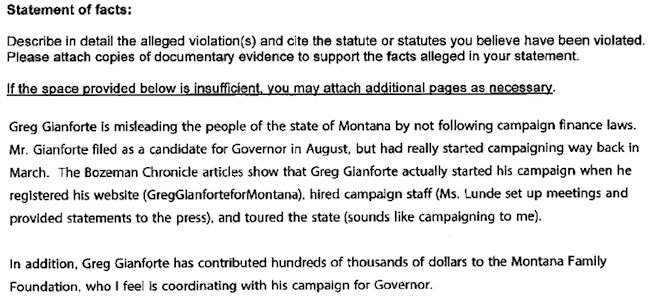Scientist and plumber pound on Gianforte. Greg Gianforte, the Bozeman businessman who sold his company and now is looking for steady work as Governor of Montana, is in trouble with a Republican physicist in Bigfork, and a Democratic plumber in Butte.
At PolyMontana, reports Montana Cowgirl, Dr. Ed Berry takes unkindly to Gianforte’s Young Earth theology. Indeed, unkindly may be too kind a description of Berry’s comments. Roger Koopman, the former legislator now serving on the Montana Public Service Commission, is another Young Earther, so he could form the lower half of a theologically consistent Republican ticket.
Meanwhile, down in Butte, journeyman plumber Richard Lee LaBreche filed a complaint with Montana’s Commission on Political Practices, alleging that Gianforte is not complying with campaign finance laws:

LaBreche neither cites the laws he believes Gianforte’s violating nor provides evidence of the alleged violations other than a copy of Gianforte’s legally filed C-1 form and a copy of a Bozeman Chronicle news story on that filing. Therefore, I expect the complaint will be dismissed, and in fairly short order.
LaBreche’s larger point, that Gianforte is tippy-toeing down the legal line, and maybe leaning over it while keeping his feet grounded in the law, has some merit.
Forest fires statistics. At forestpolicypub.com, Missoula based conservationist Matthew Koehler uses official U.S. Forest Service statistics to put the acreage burned in 2015 into historical perspective:
As of today [1 September 2015], a total of 8,202,557 acres have burned in U.S. wildfires. In 1930 and 1931, over 50 million acres burned each year and during the 10 year (hot and dry) period from the late 1920’s to the late 1930’s an AVERAGE of 30 million acres burned every year in the United States. Additionally, the 2001 National Fire Plan update indicates that an average of 145 million acres burned annually in the pre-industrial, conterminous United States.
The USFS publications upon which Koehler relies make interesting reading. They also push the limits on significant figures. Seven-digit precision is not possible in this situation; that 8,202,557 acres figure should be rounded to 8.20 million acres. The acreage reported, incidentally, is the acreage within the perimeters of the fires, which are mapped with varying levels of precision, not the acreage actually burned, which is always equal to or less than the acreage within the perimeter.
Montana loses in Ninth Circuit. Today the Ninth Circuit Court of Appeals denied Montana’s request (PDF) for a rehearing of Lair v. Bullock, the America Tradition Partnership campaign finance case dating from the 2012 campaign. Here’s the summary (not the opinion) prepared by the court’s staff:
The panel reversed the district court’s judgment, entered following a non-jury trial, and remanded in an action challenging, under the First Amendment, Montana’s dollar limits on contributions to political candidates.
The panel held that the district court applied the wrong legal standard prior to enjoining permanently the enforcement of Montana’s restrictions on campaign contributions by individuals, political action committees, and political parties. The panel held that the district court applied neither the new formulation of what constitutes an important state interest set forth in Citizens United v. Fed. Election Comm’n, 558 U.S. 310 (2010), nor the correct formulation, set forth in Mont. Right to Life Ass’n v. Eddleman, 343 F.3d 1085 (9th Cir. 2003), of whether the state’s contribution limits are “closely drawn” to the state’s goal of preventing quid pro quo corruption or its appearance. The panel remanded in order to allow Montana’s political contribution limits to be tested under the new and more restrictive standard of Citizens United, and the correct “closely drawn” test set forth in Eddleman.
Rep. Matt Monforton (R-Bozeman), one of the attorneys who argued the case, released the following statement when the decision was handed down:
The Ninth Circuit denied a petition for rehearing a few moments ago filed by Attorney General Tim Fox and [Montana Political Practices] Commissioner Jonathan Motl in Rick Hill’s case…
In May 2015, the Ninth Circuit ruled that the legal standard applied by the federal district judge in determining the constitutionality of Montana’s campaign contribution limits was too lenient in favor of the state.
Fox and Motl sought a rehearing because they know Montana’s campaign finance limits, which are the most restrictive in the nation, will not survive under the Ninth Circuit’s May 2015 ruling.
Today’s opinion makes clear that Motl’s and Fox’s obsession with using Montana’s unconstitutional campaign finance laws to bankrupt conservative Republicans needs to end. Prolonging a three-year pursuit of baseless allegations against Mr. Hill and other conservative Republican candidates who ran back in 2012 will simply waste more taxpayer monies.
There is a fair amount of speculation that next year Monforton may challenge Fox, whom deeply conservative Republicans have not, and will not, forgive for supporting the CSKT water compact, for the Republican nomination for Montana Attorney General.
Former Florida governor and U.S. Senator Lawton Chiles won five statewide campaigns while never accepting a contribution over one hundred dollars. Good politicians do not need sky high campaign contribution limits, or no campaign contribution limits at all, to win campaigns. But rich donors need high or no limits to buy elections.